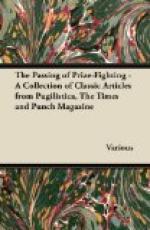of a certain strain that produces
Pennys dark
of countenance and incalculable of conduct. This
recurrence is shown in three examples: the first,
Howart Penny, in the days when men wore powder
and the
Penny forge had just been started in
what was then a British colony; the next,
Jasper,
involved in a murder trial in the sixties; and; last
of the black
Pennys, another
Howart,
in whom the family energy has thinned to a dilettante
appreciation of the arts, dying alone amongst his
collections. You can see from this outline that
the book is incidentally liable to confound the skipper,
who may find himself confronted with (apparently)
the same character tying a periwig on one page and
hiring a taxi on another. I am mistaken though
if you will feel inclined to skip a single page of
a novel at once so original and well-told. As
a detail of criticism I had the feeling that the “blackness”
of the
Penny exceptions would have shown up
better had we seen more of the family in its ordinary
rule; but of the power behind Mr. HERGESHEIMER’S
work there can be no question. He is, I am sure,
an artist upon a quite unusual scale, from whom great
things may be anticipated.
* * * *
*
If neither book of short stories before me is what
Americans call “the goods,” I can, at
any rate, say that Ancient Mariners (MILLS AND
BOON) does infinite credit to Mr. MORLEY ROBERTS’S
imagination. These yarns of seafaring men are
salt with the savour of the sea and with the language
thereof. Of the seven my favourite is “Potter’s
Plan,” which not only contains the qualities
to be found in the other half-dozen, but also has
an ingenuity all its own. But perhaps you will
prefer “A Bay Dog-Watch,” as coming home
to the general bosom, for it deals with a ferocious
hunt after matches which recalls the deadly days of
the shortage. Of the five stories in Mr. WARWICK
DEEPING’S Countess Glika (CASSELL) the
best is “Bitter Silence.” Here the
author deals with essentials, and gives us a tale entirely
free from artificiality. The remaining stories
are marred by their lack of naturalness; but Mr. DEEPING
is never at a loss for incident, and he can write
dialogue which is often gay and sometimes witty.
* * * *
*
[Illustration: THE PASSING OF THE COUPON. Our
Grocer (gone dotty with joy). “SHE
LOVES ME—SHE LOVES ME NOT—SHE
LOVES ME!”]



